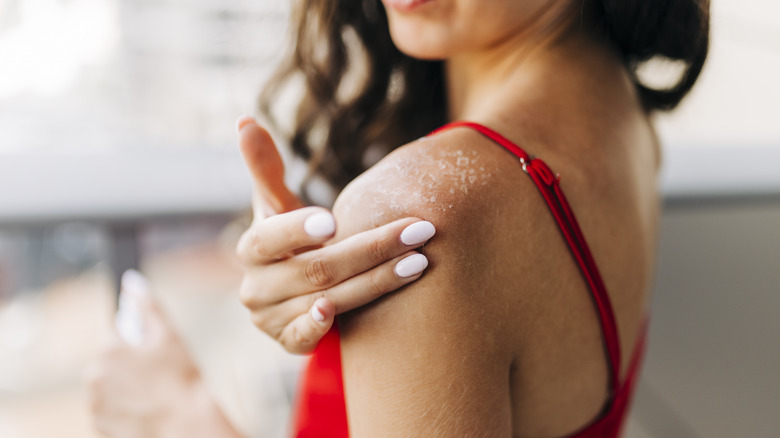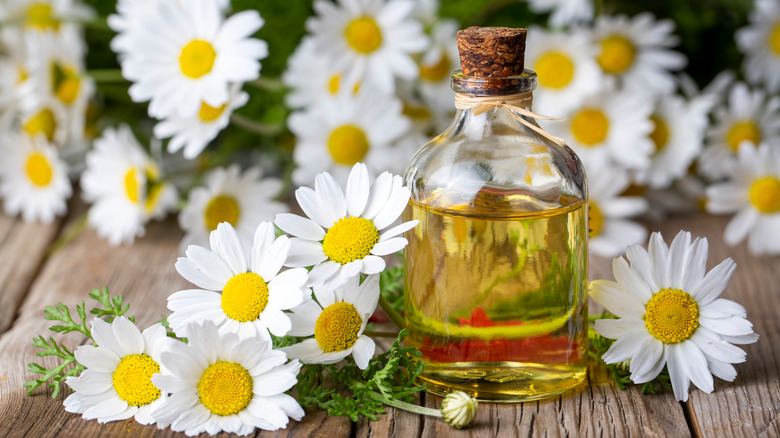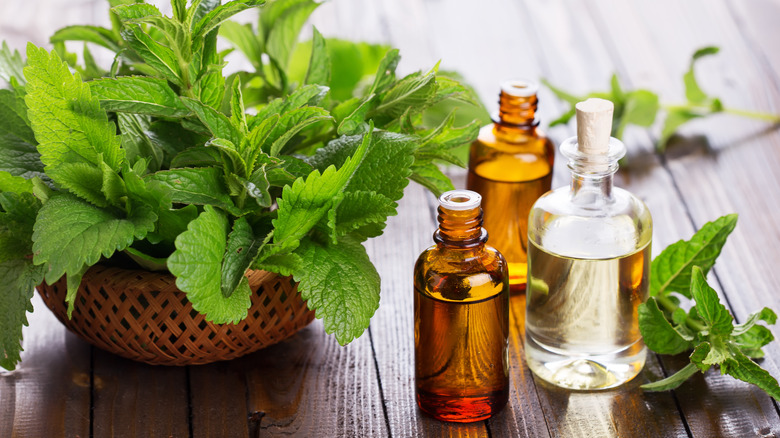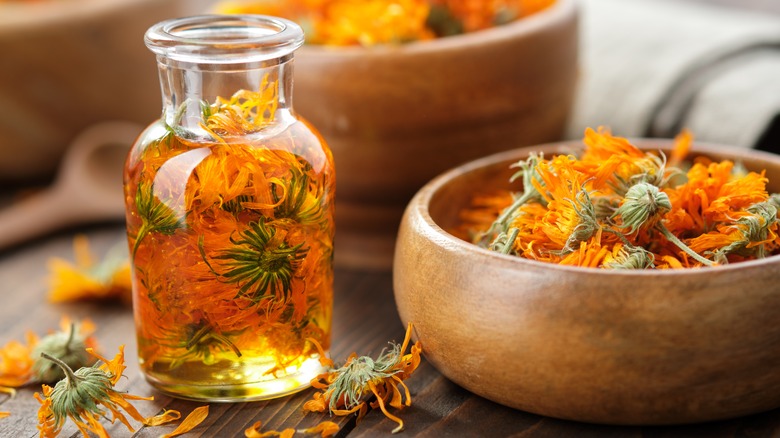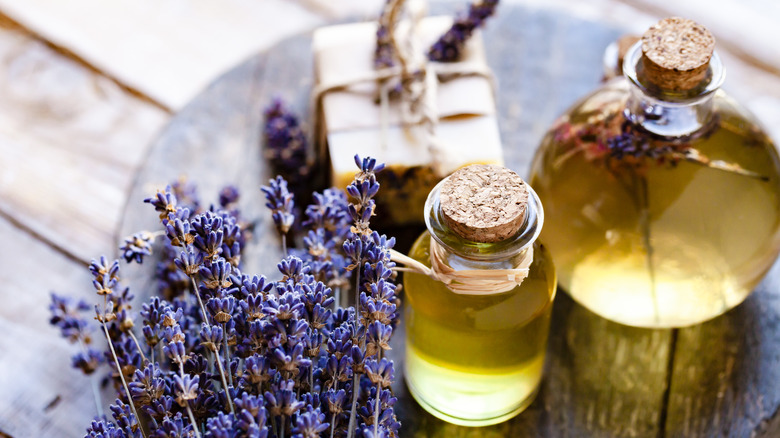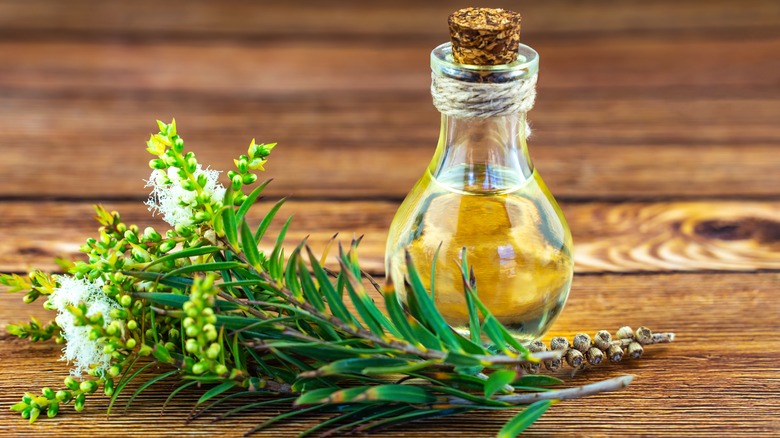Oils That Are Essential When You Have A Sunburn
Wearing sunscreen every day is just as important as drinking water. Even on cloudy days, our skin benefits from SPF. Be sure to lather up, especially if you know you're going to be soaked in the sun wherever you'll be, like near the lake or at the beach. Otherwise, you might suffer the searing consequences, aka sunburn.
Sunburn is different from traditional burns. MD Anderson Cancer Center dermatologist Saira George explained, "If the skin cells get more UV exposure than they can handle, the damage may be beyond repair, and the cells die off." That is what's really happening to your body when you notice the deep tan, redness, swelling, or inflammation of sunburn.
It is vital to treat overexposure as soon as possible. The best way to heal sunburn will eliminate the uncomfortable symptoms, and several essential oils can soothe irritation, reduce redness, and ease inflammation when you've become overbaked by UV rays.
Roman chamomile has soothing properties
If you're a tea drinker, Roman chamomile might sound familiar. This essential oil comes from a variety of the chamomile plant, which is often used for the hot beverage. Roman chamomile oil has anti-inflammatory and antibacterial properties, making it great to treat sunburn. A research paper published in the Molecular Medicine Reports showed it sped up wound healing and relieved eczema. Other topical uses for chamomile include soothing rashes, sores, and minor skin irritations.
To use Roman chamomile oil to treat sunburn, place a few drops on a cotton ball and apply it to the affected area. For sensitive skin, it is best to dilute the chamomile with a carrier oil, like avocado, jojoba, sweet almond, or hemp seed oil. You can also add up to 10 drops to your bath water for a relaxing yet medicinal dip. If you prefer cosmetics with Roman chamomile as an active ingredient, look for products with 3%-10% concentration.
For a cooling reaction, try peppermint
Dermatologist Mara Weinstein Velez told The Healthy, "The goal of treatment after sunburn is multifactorial — your skin needs intensive rehydration and a calming agent to help with the inflammation." She said, "We also need an antioxidant to scavenge the free radicals and help repair sunburned cells." As a treatment, Dr. Velez recommended peppermint for its soothing properties.
Peppermint has menthol, which gives it a cooling effect, perfect for combatting the sting of a burn. It also has antifungal properties that fight some species of bacteria and calm chronic itching. And if your sunburn comes with a sun-induced headache, peppermint oil can also help with that.
You can create a DIY sunburn spray by mixing a few drops of the essential oil with a teaspoon of aloe vera gel and one cup of water. Coconut oil is also great for diluting peppermint. Mix two tablespoons of coconut oil with a couple of drops of peppermint form a soothing rub.
Marigold reduces inflammation
Marigolds are pretty orange flowers, and their oils can be used medicinally as well. The essential oil from these blossoms is called calendula. A study published in the Journal of Young Pharmacists concluded calendula oil cream shields skin from sunlight and can be added to cosmetics as a sun protector. A cream can help pre-sunburn as much as it relieves post-burn symptoms. According to research presented in Pharmacognosy Reviews, calendula has antibacterial, anti-inflammatory, and antimicrobial properties.
Using marigold oil can smooth the irritation and inflammation caused by sunburn. Like with many essential oils, you can blend calendula with other bases like coconut, cypress, and lemon oil. You can also try a product infused with calendula oil. We love Kiehl's Calendula Petal-Infused Calming Mask. The concentrated oil is said to have a dark, earthy scent, but you can liven it up with natural fragrances like peppermint, lemon, and our next dynamic essential oil, lavender.
Lavender is a pain reliever
Integrative medicine specialist Yufang Lin told Cleveland Clinic, "Before we had antiseptics, people used lavender to clean hospital wards." He explained, "It's still used for its antimicrobial and antiviral properties." It has much of the same antibacterial functions as calendula and peppermint oil. Using lavender topically cleanses the skin while reducing inflammation and discoloration. It also has a numbing effect, great for sunburn that leaves you stiff and wincing.
To directly target your sunburn, you can make a body spritz with distilled water and a few drops of lavender. If your burn isn't too sensitive to the touch, add the essential oil to a massage lubricant to make a medicinal ointment. A few drops in your bath water also go a long way to calm the nervous system and dull pain.
If you mix your lavender with a base substance, the essential oil should be between 1%-2% concentration, which is between six and 12 drops per ounce of carrier oil.
Tea tree fights bacteria
Tea tree oil is also known as melaleuca. It is often used to treat acne because of its antibacterial characteristics, and the properties of this natural ingredient also combat skin conditions like eczema and psoriasis. Tea tree is an essential oil that can stop breakouts, treat infections, and calm swelling. The research found in the Clinical Microbiology Reviews concluded that tea tree oil could also be a substitute for antibiotics in certain conditions. Along with relieving sunburn, it can stop the itch from pesky mosquito bites.
You'll want to mix one part melaleuca with 10 parts coconut oil or another base oil to apply directly on your sunburn. It will cleanse the area, relieve pain, and minimize blistering. You can also add a few drops of tea tree oil to a hydrating lotion to boost its strength. For a handy product already mixed and measured for you, try Desert Essence's Tea Tree Oil Relief Spray.
